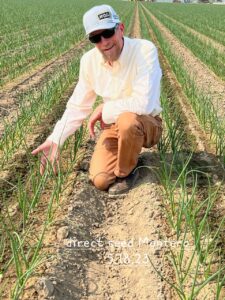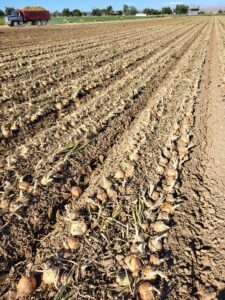Regenerative Agriculture with McCain
How McCain supports potato and onion growers
(Sponsored) With sustainability at the heart of McCain Foods’ operations to strengthen food and agricultural practices, committing to regenerative agriculture is crucial. McCain works closely with potato and onion growers alike – building farmer resilience, enhancing soil health and increasing yields. McCain also drives innovation by providing technical and financial support to farming partners to best implement regenerative agriculture practices.
Growers across the globe face increasing challenges such as rising input costs, climate change and regulatory uncertainty. To combat these uncertainties, McCain is partnering with growers to build soil health and is committed to implementing regenerative agriculture practices across 100 percent of its potato acreage worldwide by 2030.
Regenerative Agriculture is defined by McCain as “an ecosystem-based approach to farming that aims to improve farmer resilience, yield and quality by improving soil health, enhancing biodiversity and reducing the impact of synthetic inputs.”
McCain’s Regenerative Agriculture Framework is a flexible guide for potato farmers to support their transition to regen ag. Providing measurement criteria for achievement, including different levels like Onboarding, Beginner, Master and Expert, the framework measures progress based on seven indicators. These indicators include armored soils, minimized soil disturbance, enhanced crop diversity, reduced toxicity of pesticides, enhanced farm and ecosystem diversity, reduced agrochemical impact and optimized water use and increased soil organic matter.

Jeff Michael, an Onion Agronomist for McCain in Fruitland, Idaho, understands how difficult, yet rewarding, implementing regenerative agriculture techniques can be. McCain’s Onion Team is currently working to develop a similar regenerative agriculture framework for onions focused on the same seven principles of soil health.
“Onions and potatoes have similar strengths and challenges when it comes to regenerative agriculture,” Michael said. “Both are root crops with some level of required soil disturbance and often require some fumigation for a quality yield. As with potatoes, we will be consulting with our growers and standing up research projects to help address these challenges and build resilience.”
 According to Michael, McCain’s upcoming onion Regenerative Framework will be a first step toward telling the sustainable onion grower story to consumers while building soil health and resilience. Flexibility is key. Regenerative agriculture is different for every grower and their farm – it is important to tailor each program to the appropriate potato-growing and onion-growing regions. Michael believes the upcoming onion Regenerative Framework will offer this flexibility for his grower base.
According to Michael, McCain’s upcoming onion Regenerative Framework will be a first step toward telling the sustainable onion grower story to consumers while building soil health and resilience. Flexibility is key. Regenerative agriculture is different for every grower and their farm – it is important to tailor each program to the appropriate potato-growing and onion-growing regions. Michael believes the upcoming onion Regenerative Framework will offer this flexibility for his grower base.
“There’s not a better group of people to work with than the growers producing our food. It makes my job so much easier and enjoyable to work with guys who are headed down the same road already,” Michael said. “I’ve seen the programs in action and observed over this past growing season with great results – it’s McCain’s job to help accelerate the journey in partnership.”
McCain produces a wide variety of foods, including a range of appetizers such as onion rings, cheese sticks, jalapeño poppers, pickle chips and spears, breaded mushrooms and, of course, french fries and sweet potato fries. As Michael notes, “We are eager to transfer the learnings from our potato sustainability work to our other critical root crops, like onions. Stay tuned!”
To learn more about McCain, visit mccain.com.
© 2023 McCain







